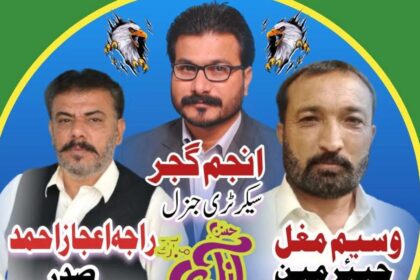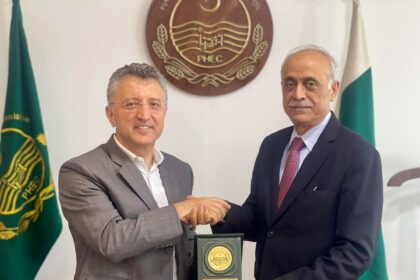MPA Shazia Jadoon Emerges as PML-N’s New Voice for Women’s Leadership and Grassroots Politics in Khyber Pakhtunkhwa
Search & Written By: Czechangez Khan Jadoon
ISLAMABAD – Shazia Jadoon’s entry into the Khyber Pakhtunkhwa Assembly marks a defining moment in the Pakistan Muslim League-Nawaz’s (PML-N) bid to strengthen its foothold in the province and promote women’s leadership in a traditionally male-dominated political landscape. Elected on a women’s reserved seat from Haripur (WR-16), Jadoon combines local social work, education-sector experience, and active party service to represent both her district’s aspirations and the party’s national message of service-oriented politics.
From Haripur to the Provincial Assembly
Taking her oath alongside other reserved-seat members in July 2025, MPA Shazia Jadoon joined the 12th KP Assembly as one of six women PML-N nominees. The reserved-seat system, designed to ensure women’s representation in Pakistan’s legislatures, has served as a crucial entry point for politically active women like Jadoon. Her profile lists a B.Ed degree and local-level leadership experience in Haripur’s education and welfare sectors—credentials that resonate in a province where women’s participation in governance remains limited.
PML-N’s Strategy in KP
For PML-N, nominating Jadoon represents both a political and symbolic move. Historically strong in Punjab, the party seeks to project inclusivity and expand its footprint across Pakistan’s provinces. By elevating women leaders from regions like Haripur, PML-N aims to underscore its commitment to women’s empowerment and community service, especially in a province shaped by conservative social norms. The party’s leadership has repeatedly highlighted its intent to turn reserved-seat nominees into policy-driven legislators, rather than symbolic appointees.
Legislative Focus and Public Image
Known locally as a grassroots social worker, Shazia Jadoon projects herself as an accessible and empathetic representative rather than a career politician. Her Assembly interventions have focused on tangible service issues—such as the functioning of the Haripur Trauma Center, improvement of healthcare facilities, and infrastructure upgrades in rural areas.
Observers note that her legislative record reflects practical engagement: raising questions on local governance, highlighting education-sector deficiencies, and moving motions addressing public-service shortcomings.
Women’s Leadership and Social Impact
Jadoon’s emergence highlights how women legislators can challenge entrenched gender barriers in provincial politics. In Haripur’s socially traditional environment, her visibility provides a focal point for female civic engagement and community organizing. Her background—combining tehsil-level political work and women’s wing leadership within PML-N—reflects a growing pattern among Pakistani women who use local activism as a springboard into legislative politics.
Her continued engagement with women’s groups, education forums, and welfare programs shows an effort to translate social work into sustained political influence.
Challenges Ahead
Despite her growing visibility, Jadoon faces the structural hurdles common to reserved-seat members: limited autonomy within party hierarchies, reduced access to development funds, and a crowded legislative agenda that prioritizes national over local issues. Converting speeches and symbolic representation into policy outcomes will require coalition-building and committee influence.
However, her focus on education, women’s welfare, and health services gives her a clear policy niche to build credibility and long-term influence within the Assembly.
The Haripur Factor and PML-N’s Broader Strategy
Haripur remains strategically vital in PML-N’s Hazara-region politics. By nominating Shazia Jadoon, the party signals both continuity and renewal—continuity in its grassroots networks and renewal in its commitment to inclusive representation. Analysts see her as part of the party’s attempt to project modern, service-oriented women leaders capable of mobilizing female voters and bridging the gap between social activism and provincial policymaking.
Beyond Tokenism: Toward Substantive Representation
The debate around women’s reserved seats—whether they empower or merely symbolize inclusion—remains central. Jadoon’s performance may become a test case for whether women legislators in Pakistan can move from token participation to meaningful policy influence. Her combination of emotional advocacy in the Assembly and substantive follow-up through motions and questions suggests a hybrid legislative style—empathetic yet action-driven.
Outlook: Turning Representation into Policy
As Jadoon settles into her tenure, her success will depend on her ability to institutionalize her advocacy—developing working groups, drafting targeted bills, and collaborating with civil-society partners. If she continues to align education, healthcare, and women’s welfare under a coherent legislative agenda, she could evolve from a reserved-seat appointee into a recognized policy actor in KP’s political landscape.
For PML-N, her presence in the Assembly strengthens its claim to gender inclusion and service politics. For Haripur’s women, Shazia Jadoon represents more than a party nomination—she embodies the possibility of real representation in a system still grappling with structural inequality.











